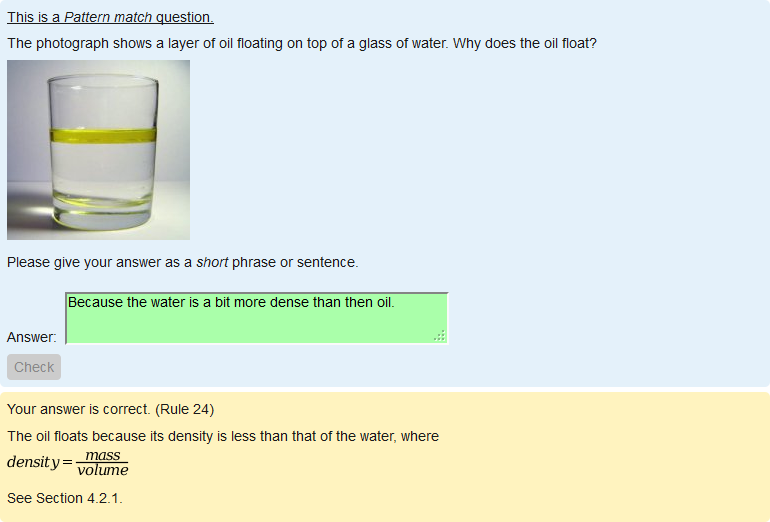Pattern-match question type: Difference between revisions
| Pattern-match question type | |
|---|---|
| Type | question type |
| Set | N/A |
| Downloads | https://moodle.org/plugins/qtype_pmatch |
| Issues | https://github.com/moodleou/moodle-qtype_pmatch |
| Discussion | https://moodle.org/mod/forum/view.php?id=737 |
| Maintainer(s) | Tim Hunt |
m (added link to spanish translation of document) |
m (* Regular Expression Short-Answer question type additional plugin (that can easily account for permutations and accepting any combination of blank spaces).) |
||
| (12 intermediate revisions by 3 users not shown) | |||
| Line 1: | Line 1: | ||
{{Questions}}Pattern-match questions allow the student to give an answer of up to about 20 words, which can then be automatically graded by matching the students response against a number of different patterns expressed in the PMatch syntax. The first matching pattern determines the score and the feedback. | {{Infobox plugin | ||
|type = question type | |||
|entry = https://moodle.org/plugins/qtype_pmatch | |||
|tracker = https://github.com/moodleou/moodle-qtype_pmatch | |||
|discussion = https://moodle.org/mod/forum/view.php?id=737 | |||
|maintainer = [[user:Tim Hunt|Tim Hunt]] | |||
|float = right | |||
}}{{Questions}} | |||
Pattern-match questions allow the student to give an answer of up to about 20 words, which can then be automatically graded by matching the students response against a number of different patterns expressed in the PMatch syntax. The first matching pattern determines the score and the feedback. | |||
[[File:pmatch.png]] | [[File:pmatch.png]] | ||
This is a question type created and maintained by the Open University. | This is a question type created and maintained by the Open University. | ||
{{Note|This question type assumes that the [https://docs.moodle.org/dev/Decimal_separator#Pmatch_and_other_Open_University_question_types_problems.3D decimal separator] is a full stop. It will not work if you try to use a a decimal comma.}} | |||
== More documentation == | == More documentation == | ||
* See [[Pattern-match question type detailed documentation]]. | |||
More [http:// | More [http://www.open.edu/openlearnworks/course/view.php?id=1581 documentation is available] in the [http://www.open.edu/openlearnworks/mod/oucontent/view.php?id=52747 Open University's reference manual]. That includes a description of the pmatch syntax. There is another page that explains [[:dev:The_OU_PMatch_algorithm|The OU PMatch algorithm]], but that was written before development started, and may not be a 100% accurate description of what was finally implemented. | ||
== See also == | == See also == | ||
| Line 14: | Line 24: | ||
* [http://moodle.org/plugins/browse.php?list=category&id=29 Other third-party question type plugins] | * [http://moodle.org/plugins/browse.php?list=category&id=29 Other third-party question type plugins] | ||
* [http://labspace.open.ac.uk/course/view.php?id=3484 eAssessment at the Open University with open source software] | * [http://labspace.open.ac.uk/course/view.php?id=3484 eAssessment at the Open University with open source software] | ||
* [[Regular Expression Short-Answer question type]] additional plugin (that can easily account for permutations and accepting any combination of blank spaces). | |||
* [[Essay (auto-grade) question type]] additional plugin | |||
* [[Preg question type]] additional plugin (for Moodle branches 2.3 to 3.1 only) | |||
[[Category:Contributed code]] | [[Category:Contributed code]] | ||
[[Category:Questions]] | |||
[[Category:Open University]] | |||
[[es:Tipo de pregunta coincidencia de patrón]] | [[es:Tipo de pregunta coincidencia de patrón]] | ||
[[de:Fragetyp Musterabgleich]] | |||
Latest revision as of 19:47, 14 January 2020
- Managing questions
- Question behaviours
- Question types
- Calculated
- Simple Calculated
- Drag and drop into text
- Drag and drop markers
- Drag and drop onto image
- Calculated Multichoice
- Description
- Essay
- Matching
- Embedded Answers (Cloze)
- Multiple Choice
- Random Short Answer Matching
- Select missing words
- Short-Answer
- Numerical
- True/False
- Third-party question types
- Questions FAQ
Pattern-match questions allow the student to give an answer of up to about 20 words, which can then be automatically graded by matching the students response against a number of different patterns expressed in the PMatch syntax. The first matching pattern determines the score and the feedback.
This is a question type created and maintained by the Open University.
More documentation
More documentation is available in the Open University's reference manual. That includes a description of the pmatch syntax. There is another page that explains The OU PMatch algorithm, but that was written before development started, and may not be a 100% accurate description of what was finally implemented.
See also
- Other Moodle plugins from the Open University
- Other third-party question type plugins
- eAssessment at the Open University with open source software
- Regular Expression Short-Answer question type additional plugin (that can easily account for permutations and accepting any combination of blank spaces).
- Essay (auto-grade) question type additional plugin
- Preg question type additional plugin (for Moodle branches 2.3 to 3.1 only)
